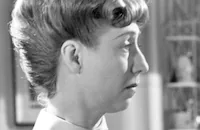The Best Man

Brief Synopsis
Cast & Crew
Franklin J. Schaffner
Henry Fonda
Cliff Robertson
Edie Adams
Margaret Leighton
Shelley Berman
Film Details
Technical Specs

Synopsis
At a U. S. presidential nominating convention in Los Angeles, the leading presidential candidates are William Russell, former Secretary of State, and Joe Cantwell, an unscrupulous conservative senator. To avoid scandal, Russell and his estranged wife have reconciled for the duration of the campaign. Cantwell, however, plans to exploit Russell's past history of mental illness. Both candidates seek the endorsement of Art Hockstader, a devious former president, who dies during the convention. Although he is told that Cantwell was an active homosexual in the Army, Russell refuses to divulge this information to the press. Sickened by such slander, Russell ends his candidacy, throwing his support to a third contender. In so doing, he regains his wife's love.

Director

Franklin J. Schaffner
Cast

Henry Fonda

Cliff Robertson

Edie Adams

Margaret Leighton
Shelley Berman

Lee Tracy

Ann Sothern

Gene Raymond

Kevin Mccarthy
Mahalia Jackson
Howard K. Smith
John Henry Faulk

Richard Arlen

Penny Singleton
George Kirgo
George Furth
Anne Newman
Mary Lawrence
H. E. West
Michael Macdonald
William R. Eberson
Natalie Masters

Blossom Rock
Bill Stout
Tyler Mcvey
Sherwood Keith
Crew
Depatie--freleng
Max Frankel
Don Hall Jr.
James Henrikson
Ben Hersh
Dorothy Jeakins
Mort Lindsey
Tom Mankiewicz
Richard Mansfield
Stuart Millar
Dick Moder
Marion Rosenberg
Jack Solomon
Robert Swink
Lawrence Turman
Gore Vidal
Haskell Wexler
Lyle Wheeler

Videos
Movie Clip


Trailer
Hosted Intro



Promo
Film Details
Technical Specs

Award Nominations
Best Supporting Actor
Articles
The Best Man
It's easy to see William Russell as the Adelai Stevenson stand-in, Joe Cantwell as a combination of Richard Nixon and Joe McCarthy, and the ex-President as a kindred spirit of Harry Truman. What no one could have foreseen, however, is how some of the melodramatic situations in The Best Man mirrored real-life incidents in later years, particularly the sequence where William Russell's past emotional problems are revealed in a dossier. In the 1972 Presidential campaign, senator Tom Eagleton, George McGovern's choice for Vice-President, redrew from the race after revealing he had suffered a mental breakdown earlier in his career.
Before The Best Man was actually slated as a project for director Franklin J. Schaffner, Frank Capra was seriously considered as a director by United Artists, the company that owned the property. It had been three years since Capra's last film, A Pocketful of Miracles, and the famous director had some unique ideas for this production which did not sit well with Gore Vidal, author of the original play. For one thing Capra wanted to add a climatic scene where Henry Fonda's character, who is losing the vote at the Democratic convention, makes an appearance on the delegate floor dressed as Abraham Lincoln and makes an inspiring speech. Gore tried hard to mask his horror at this suggestion but in his autobiography, Palimpsest (Random House), he wrote, "The Capra-Connolly script for The Best Man invents a new protagonist: the hero is no longer the man who refuses to blackmail his opponent because "one by one, these compromises, these small corruptions destroy "character" but the dark horse of the title, who receives the nomination when the two leading candidates cancel each other out -The Best Man, in their grotesquely sentimentalized version, is the guileless young mixed race governor of Hawaii, their muddled notion of a John Doe for the 1960s."
Luckily, United Artists found the Frank Capra-Walter Connolly version of The Best Man unacceptable and decided to let Gore Vidal dictate the director and write the screenplay. Capra would never make another film.
Director: Franklin J. Schaffner
Producer: Stuart Millar, Lawrence Turman
Screenplay: Gore Vidal (based on his play of the same name)
Cinematography: Haskell Wexler
Editing: Robert Swink
Music: Mort Lindsey
Cast: Henry Fonda (William Russell), Cliff Robertson (Joe Cantwell), Lee Tracy (Art Hockstader), Margaret Leighton (Alice Russell), Edie Adams (Mabel Cantwell), Kevin McCarthy (Dick Jensen), Shelley Berman (Sheldon Bascomb), Ann Sothern (Mrs. Gamadge), Gene Raymond (Dan Cantwell).
BW-103m. Letterboxed.
by Jeff Stafford

The Best Man
Quotes
Nice thing about you, Joe, is that you can sound like a liberal, but at heart you're an American- T.T. Claypoole
T.T. Claypoole has all the characteristics of a dog except loyalty.- William Russell
Trivia
Notes
Includes newsreel footage of the 1960 U. S. presidential nominating conventions.

Miscellaneous Notes
Released in United States 1964
Released in United States 1964















